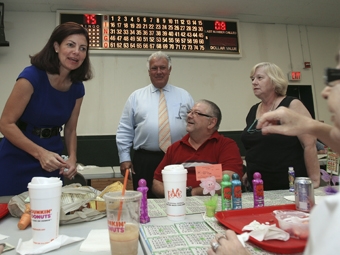
(Host) In this year’s mid-term elections, environmental issues have largely taken a back seat to jobs and the economy. But here in the Northeast, one trend is changing the political landscape.
Many Republicans in the region once backed climate change legislation, and embraced a policy known as "cap-and-trade" to reduce greenhouse gases.
But a lot of Republican candidates in the Northeast are now campaigning aggressively against cap-and-trade.
As part of a collaboration with Northeast public radio stations, North Country Public Radio’s Brian Mann reports.
(Mann) Three years ago when Republican congressman John McHugh from Upstate New York introduced an ambitious new national cap-and-trade bill, he was hoping to curb acid rain caused by coal burning power plants in the Midwest.
He acknowledged at the time that he hadn’t given his own party leaders advance notice of the bill because he wanted to keep them from blocking it or watering it down.
(McHugh) "I didn’t want to give my dear friend and my leader John Boehner any more lead time than was necessary, quite frankly."
(Mann) At the time, McHugh was blunt about the fact that Northeastern Republicans like himself often saw environmental issues very differently than their national party.
Nowhere was this tension more visible than on cap-and trade.
Northeastern Republicans helped to champion this policy, which can be used to set limits on pollution, whether it be acid rain or greenhouse gases.
A marketplace is established where clean companies benefit by selling pollution credits. Those incentives spark innovation, helping to cut emissions far more cheaply.
McHugh was one of eight Republicans in the country who voted in favor of a Democratic measure that would use the cap-and-trade strategy to cut carbon emissions.
But the Republican now running for his old seat, Matt Doheny, argued during a debate last month that cap-and-trade is a terrible idea.
(Doheny) "What it simply does is say everyone’s going to pay more for energy costs across the board. It’s going to hurt our productivity and growth right here in the United States."
(Mann) That’s become a rallying cry for Republicans across the country and here in the Northeast.
In Connecticut, Senate Republican candidate Linda McMahon has made opposition to cap and trade a centerpiece of her campaign against Democrat Richard Blumenthal.
In New Hampshire, Republican Senate candidate Kelly Ayotte says she’s not convinced global warming has been proved "conclusively" and she too opposes the cap-and-trade bill, which she calls a tax.
Jim O’Brien of Conservation New Hampshire says environmentalists have lost the support of many regional Republicans who they once viewed as allies.
(O’Brien) "Here in New Hampshire, I mean we’re not kidding ourselves, the Republican Party platform has an action item in there to remove the state from RGGI."
(Mann) "RGGI" is a regional cap-and-trade carbon auction program first proposed by George Pataki – then New York’s Republican governor – in 2003.
It was organized in part with the help other Republican governors, including those from Connecticut and Vermont.
Since 2008 that program has generated more than $700 million for renewable energy and efficiency programs.
Despite that success, a Republican lawmaker from New Jersey has also introduced legislation to pull that state out of the program.
And Maine’s Republican platform calls for the party to ‘defeat cap and trade.’
Rob Sisson, president of Republicans for Environmental Protection, based in Michigan is frustrated by this trend, which he says is led by conservative Tea Partiers.
(Sisson) "So we’re seeing incumbents who have been good on our issues start moving to the right to fend off those challenges."
(Mann) But Sisson says when rank-and-file Republican voters learn more details about cap-and-trade, they often support the policy.
Anthony Leiserowitz from the Yale Center on Climate Change Communication says supporters of cap-and-trade have done a ‘lousy’ job explaining how it works or why it’s effective.
(Leiserowitz) "That has left a vacuum where the opponents of the bill thereby rushed in and labeled it as a cap and tax bill and have been now using it ever since to try to flog their political opponents."
(Mann) But environmental groups and Republican moderates say they hope support for cap and trade will rebound in the Northeast, once this year’s election frenzy has passed.
For VPR News, I’m Brian Mann.
(Host outro) Northeast environmental reporting is made possible, in part, by a grant from United Technologies. The coverage is part of NPR’s Local News Initiative.